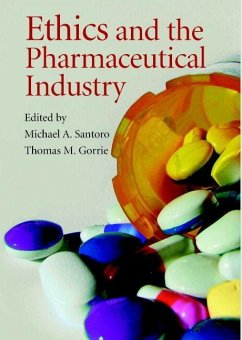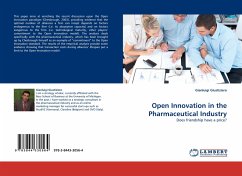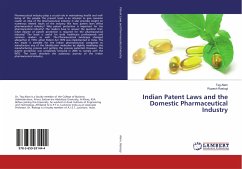- Gebundenes Buch
- Merkliste
- Auf die Merkliste
- Bewerten Bewerten
- Teilen
- Produkt teilen
- Produkterinnerung
- Produkterinnerung
Michael A. Santoro and Thomas M. Gorrie have invited representatives of government and NGOs, top industry executives, doctors, and scholars to share their views on the most vital and controversial moral issues facing the pharmaceutical industry today. Where do the lines begin and end between the pharmaceutical industrys responsibility to society and to its own profit/loss considerations? This question is considered across a range of activities, including research and clinical trials, drug pricing, patent protection, and advertising and marketing to doctors and patients.
Andere Kunden interessierten sich auch für
![Ethics and the Pharmaceutical Industry Ethics and the Pharmaceutical Industry]() Michael A. Santoro / Thomas M. GorrieEthics and the Pharmaceutical Industry46,99 €
Michael A. Santoro / Thomas M. GorrieEthics and the Pharmaceutical Industry46,99 €![Open Innovation in the Pharmaceutical Industry Open Innovation in the Pharmaceutical Industry]() Gianluigi GiustizieroOpen Innovation in the Pharmaceutical Industry33,99 €
Gianluigi GiustizieroOpen Innovation in the Pharmaceutical Industry33,99 €![A Study of the Indian Pharmaceutical Industry in the New Patent Regime A Study of the Indian Pharmaceutical Industry in the New Patent Regime]() Abhinava SinghA Study of the Indian Pharmaceutical Industry in the New Patent Regime53,99 €
Abhinava SinghA Study of the Indian Pharmaceutical Industry in the New Patent Regime53,99 €![The Chemical and Pharmaceutical Industry in China The Chemical and Pharmaceutical Industry in China]() The Chemical and Pharmaceutical Industry in China39,99 €
The Chemical and Pharmaceutical Industry in China39,99 €![Indian Patent Laws and the Domestic Pharmaceutical Industry Indian Patent Laws and the Domestic Pharmaceutical Industry]() Teg AlamIndian Patent Laws and the Domestic Pharmaceutical Industry41,99 €
Teg AlamIndian Patent Laws and the Domestic Pharmaceutical Industry41,99 €![A Study on Capital Structure of Pharmaceutical Industry A Study on Capital Structure of Pharmaceutical Industry]() Jigar V PatelA Study on Capital Structure of Pharmaceutical Industry49,99 €
Jigar V PatelA Study on Capital Structure of Pharmaceutical Industry49,99 €![EFFICIENCY OF WORKING CAPITAL MANAGEMENT IN PHARMACEUTICAL INDUSTRY EFFICIENCY OF WORKING CAPITAL MANAGEMENT IN PHARMACEUTICAL INDUSTRY]() Prabhpreet KaurEFFICIENCY OF WORKING CAPITAL MANAGEMENT IN PHARMACEUTICAL INDUSTRY52,99 €
Prabhpreet KaurEFFICIENCY OF WORKING CAPITAL MANAGEMENT IN PHARMACEUTICAL INDUSTRY52,99 €-
-
-
Michael A. Santoro and Thomas M. Gorrie have invited representatives of government and NGOs, top industry executives, doctors, and scholars to share their views on the most vital and controversial moral issues facing the pharmaceutical industry today. Where do the lines begin and end between the pharmaceutical industrys responsibility to society and to its own profit/loss considerations? This question is considered across a range of activities, including research and clinical trials, drug pricing, patent protection, and advertising and marketing to doctors and patients.
Hinweis: Dieser Artikel kann nur an eine deutsche Lieferadresse ausgeliefert werden.
Hinweis: Dieser Artikel kann nur an eine deutsche Lieferadresse ausgeliefert werden.
Produktdetails
- Produktdetails
- Verlag: Cambridge University Press
- Seitenzahl: 528
- Erscheinungstermin: 1. Juni 2015
- Englisch
- Abmessung: 235mm x 157mm x 35mm
- Gewicht: 999g
- ISBN-13: 9780521854962
- ISBN-10: 0521854962
- Artikelnr.: 21168173
- Herstellerkennzeichnung
- Libri GmbH
- Europaallee 1
- 36244 Bad Hersfeld
- gpsr@libri.de
- Verlag: Cambridge University Press
- Seitenzahl: 528
- Erscheinungstermin: 1. Juni 2015
- Englisch
- Abmessung: 235mm x 157mm x 35mm
- Gewicht: 999g
- ISBN-13: 9780521854962
- ISBN-10: 0521854962
- Artikelnr.: 21168173
- Herstellerkennzeichnung
- Libri GmbH
- Europaallee 1
- 36244 Bad Hersfeld
- gpsr@libri.de
Michael A. Santoro is Associate Professor with tenure in the Business Environment Department at Rutgers Business School, where he teaches courses on business ethics, public policy, labor and human rights, law, ethical issues in the pharmaceutical industry, and China business strategy. Professor Santoro holds a PhD in Public Policy from Harvard University and a JD from the New York University School of Law. As a Research Associate at Harvard Business School, he wrote or co-authored nearly 30 case studies and teaching notes on ethical and legal topics such as global protection of intellectual property, insider trading, the Federal Sentencing Guidelines, and the Fair Credit Reporting Act. Professor Santoro has also published numerous journal articles, op-ed articles, and book chapters on these topics in publications such as Foreign Policy, and Human Rights Quarterly. He is the author of Profits and Principles: Global Capitalism and Human Rights in China (2000).
Charting a sustainable path for the 21st century pharmaceutical industry
Michael A. Santoro; Part I. Profits, Patients' Rights, and Scientific
Progress: The Ethics of Clinical Research Conducted in Private Enterprises:
1. Drug research: between ethical demands and economic constraints Jurgen
Drews; 2. Emerging international norms for clinical testing: good clinical
trial practice Juhana E. Idanpaan-Heikkila and Sev S. Fluss; 3. The
regulatory and ethical challenges of pediatric research M. Dianne Murphy
and Sara F. Goldkind; 4. Including children in research: participation or
exploitation? Robert M. Nelson; 5. Racial and ethnic inclusiveness in
clinical trials Valentine J. Burroughs; 6. The rights of patients to
participate in clinical trials Glenna Crooks; 7. How should government
regulate stem-cell research? Perspectives of a scientist-legislator The
Hon. Rush Holt; Part II. Marketing and the Efficient Utilization of
Healthcare Resources: Ethical and Public Policy Challenges: 8. Ethics and
prescribing: the clinician's perspective Charles L. Bardes; 9.
Direct-to-consumer advertising of prescription drugs: a policy dilemma
Meredith B. Rosenthal and Julie M. Donohue; 10. Regulation of prescription
drug promotion Thomas Abrams; 11. Off-label communications in marketing
prescription drugs Scott D. Danzis; 12. The need for better health
information: advancing the informed patient in Europe Don E. Detmer, Peter
Singleton and Scott C. Ratzan; 13. Who should get access to which drugs? An
ethical template for pharmacy benefits Norman Daniels, James E. Sabin and
J. Russell Teagarden; 14. The application of cost-effectiveness and
cost-benefit analysis to pharmaceuticals Joel Hay; Part III. Patents,
Pricing, and Equal Access: 15. Intellectual property rights, access to
life-enhancing drugs, and corporate moral responsibilities Patricia H.
Werhane and Michael Gorman; 16. A future agenda for government-industry
relations William Weldon; 17. AIDS activism and the pharmaceutical industry
Martin Delaney; 18. The campaign against innovation Sidney Taurel; 19.
Third world perspectives on global pharmaceutical access James Thuo Gathii;
20. The promise of vaccines and the influenza shortage of 2004: public and
private partnerships Gary R. Noble; Part IV. Charting a Sustainable Path
for the 21st Century: 21. Evolving approaches to healthcare challenges
Thomas M. Gorrie; 22. Property rights in crisis: managers and rescue
Nien-he Hsieh; 23. Blurring the lines: public and private partnerships
addressing global health William Foege; 24. Renegotiating the grand
bargain: balancing prices, profits, people, and principles Greg Koski.
Michael A. Santoro; Part I. Profits, Patients' Rights, and Scientific
Progress: The Ethics of Clinical Research Conducted in Private Enterprises:
1. Drug research: between ethical demands and economic constraints Jurgen
Drews; 2. Emerging international norms for clinical testing: good clinical
trial practice Juhana E. Idanpaan-Heikkila and Sev S. Fluss; 3. The
regulatory and ethical challenges of pediatric research M. Dianne Murphy
and Sara F. Goldkind; 4. Including children in research: participation or
exploitation? Robert M. Nelson; 5. Racial and ethnic inclusiveness in
clinical trials Valentine J. Burroughs; 6. The rights of patients to
participate in clinical trials Glenna Crooks; 7. How should government
regulate stem-cell research? Perspectives of a scientist-legislator The
Hon. Rush Holt; Part II. Marketing and the Efficient Utilization of
Healthcare Resources: Ethical and Public Policy Challenges: 8. Ethics and
prescribing: the clinician's perspective Charles L. Bardes; 9.
Direct-to-consumer advertising of prescription drugs: a policy dilemma
Meredith B. Rosenthal and Julie M. Donohue; 10. Regulation of prescription
drug promotion Thomas Abrams; 11. Off-label communications in marketing
prescription drugs Scott D. Danzis; 12. The need for better health
information: advancing the informed patient in Europe Don E. Detmer, Peter
Singleton and Scott C. Ratzan; 13. Who should get access to which drugs? An
ethical template for pharmacy benefits Norman Daniels, James E. Sabin and
J. Russell Teagarden; 14. The application of cost-effectiveness and
cost-benefit analysis to pharmaceuticals Joel Hay; Part III. Patents,
Pricing, and Equal Access: 15. Intellectual property rights, access to
life-enhancing drugs, and corporate moral responsibilities Patricia H.
Werhane and Michael Gorman; 16. A future agenda for government-industry
relations William Weldon; 17. AIDS activism and the pharmaceutical industry
Martin Delaney; 18. The campaign against innovation Sidney Taurel; 19.
Third world perspectives on global pharmaceutical access James Thuo Gathii;
20. The promise of vaccines and the influenza shortage of 2004: public and
private partnerships Gary R. Noble; Part IV. Charting a Sustainable Path
for the 21st Century: 21. Evolving approaches to healthcare challenges
Thomas M. Gorrie; 22. Property rights in crisis: managers and rescue
Nien-he Hsieh; 23. Blurring the lines: public and private partnerships
addressing global health William Foege; 24. Renegotiating the grand
bargain: balancing prices, profits, people, and principles Greg Koski.
Charting a sustainable path for the 21st century pharmaceutical industry
Michael A. Santoro; Part I. Profits, Patients' Rights, and Scientific
Progress: The Ethics of Clinical Research Conducted in Private Enterprises:
1. Drug research: between ethical demands and economic constraints Jurgen
Drews; 2. Emerging international norms for clinical testing: good clinical
trial practice Juhana E. Idanpaan-Heikkila and Sev S. Fluss; 3. The
regulatory and ethical challenges of pediatric research M. Dianne Murphy
and Sara F. Goldkind; 4. Including children in research: participation or
exploitation? Robert M. Nelson; 5. Racial and ethnic inclusiveness in
clinical trials Valentine J. Burroughs; 6. The rights of patients to
participate in clinical trials Glenna Crooks; 7. How should government
regulate stem-cell research? Perspectives of a scientist-legislator The
Hon. Rush Holt; Part II. Marketing and the Efficient Utilization of
Healthcare Resources: Ethical and Public Policy Challenges: 8. Ethics and
prescribing: the clinician's perspective Charles L. Bardes; 9.
Direct-to-consumer advertising of prescription drugs: a policy dilemma
Meredith B. Rosenthal and Julie M. Donohue; 10. Regulation of prescription
drug promotion Thomas Abrams; 11. Off-label communications in marketing
prescription drugs Scott D. Danzis; 12. The need for better health
information: advancing the informed patient in Europe Don E. Detmer, Peter
Singleton and Scott C. Ratzan; 13. Who should get access to which drugs? An
ethical template for pharmacy benefits Norman Daniels, James E. Sabin and
J. Russell Teagarden; 14. The application of cost-effectiveness and
cost-benefit analysis to pharmaceuticals Joel Hay; Part III. Patents,
Pricing, and Equal Access: 15. Intellectual property rights, access to
life-enhancing drugs, and corporate moral responsibilities Patricia H.
Werhane and Michael Gorman; 16. A future agenda for government-industry
relations William Weldon; 17. AIDS activism and the pharmaceutical industry
Martin Delaney; 18. The campaign against innovation Sidney Taurel; 19.
Third world perspectives on global pharmaceutical access James Thuo Gathii;
20. The promise of vaccines and the influenza shortage of 2004: public and
private partnerships Gary R. Noble; Part IV. Charting a Sustainable Path
for the 21st Century: 21. Evolving approaches to healthcare challenges
Thomas M. Gorrie; 22. Property rights in crisis: managers and rescue
Nien-he Hsieh; 23. Blurring the lines: public and private partnerships
addressing global health William Foege; 24. Renegotiating the grand
bargain: balancing prices, profits, people, and principles Greg Koski.
Michael A. Santoro; Part I. Profits, Patients' Rights, and Scientific
Progress: The Ethics of Clinical Research Conducted in Private Enterprises:
1. Drug research: between ethical demands and economic constraints Jurgen
Drews; 2. Emerging international norms for clinical testing: good clinical
trial practice Juhana E. Idanpaan-Heikkila and Sev S. Fluss; 3. The
regulatory and ethical challenges of pediatric research M. Dianne Murphy
and Sara F. Goldkind; 4. Including children in research: participation or
exploitation? Robert M. Nelson; 5. Racial and ethnic inclusiveness in
clinical trials Valentine J. Burroughs; 6. The rights of patients to
participate in clinical trials Glenna Crooks; 7. How should government
regulate stem-cell research? Perspectives of a scientist-legislator The
Hon. Rush Holt; Part II. Marketing and the Efficient Utilization of
Healthcare Resources: Ethical and Public Policy Challenges: 8. Ethics and
prescribing: the clinician's perspective Charles L. Bardes; 9.
Direct-to-consumer advertising of prescription drugs: a policy dilemma
Meredith B. Rosenthal and Julie M. Donohue; 10. Regulation of prescription
drug promotion Thomas Abrams; 11. Off-label communications in marketing
prescription drugs Scott D. Danzis; 12. The need for better health
information: advancing the informed patient in Europe Don E. Detmer, Peter
Singleton and Scott C. Ratzan; 13. Who should get access to which drugs? An
ethical template for pharmacy benefits Norman Daniels, James E. Sabin and
J. Russell Teagarden; 14. The application of cost-effectiveness and
cost-benefit analysis to pharmaceuticals Joel Hay; Part III. Patents,
Pricing, and Equal Access: 15. Intellectual property rights, access to
life-enhancing drugs, and corporate moral responsibilities Patricia H.
Werhane and Michael Gorman; 16. A future agenda for government-industry
relations William Weldon; 17. AIDS activism and the pharmaceutical industry
Martin Delaney; 18. The campaign against innovation Sidney Taurel; 19.
Third world perspectives on global pharmaceutical access James Thuo Gathii;
20. The promise of vaccines and the influenza shortage of 2004: public and
private partnerships Gary R. Noble; Part IV. Charting a Sustainable Path
for the 21st Century: 21. Evolving approaches to healthcare challenges
Thomas M. Gorrie; 22. Property rights in crisis: managers and rescue
Nien-he Hsieh; 23. Blurring the lines: public and private partnerships
addressing global health William Foege; 24. Renegotiating the grand
bargain: balancing prices, profits, people, and principles Greg Koski.








